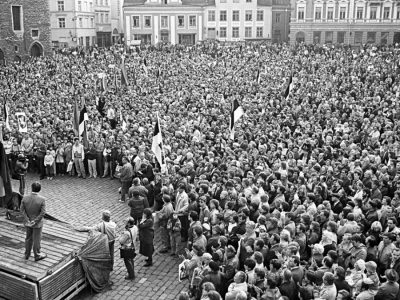A general theme in transitions of power is this, “out with the old, in with the new.” Following his ascension to First Secretary, Nikita Khrushchev pursued a policy of De-Stalinization and decentralization. These policies bolstered Khrushchev’s position within the party as well as dismantled Stalin’s lasting influence in Soviet politics. One controversial move by Khrushchev … Continue reading Crashing the Anti-Party![]()
Tag: De-Stalinization
Kossuth Rising: Resurgent Nationalism and Counterrevolution.
by •
Following the death of Josef Stalin in March 1953, the member nations of the Warsaw Pact faced an existential crisis. … More![]()
The Struggle for Freedom
by •
One of the most significant events to happen after Stalin’s death, was the release of prisoners from camps ran by the GULAG (Main Administration of Corrective Labor Camps). While the road of succession was full of challenges and awards, the release of prisoners created a new chapter for those who lost hope and faith in… Continue reading The Struggle for Freedom →![]()
The Virgin Lands Program
by •
After Stalin’s death, a period of reforms and changes began to take hold in the USSR. Among many changes and initiatives that took place, Khrushchev’s Virgin Lands Program was significant. The Virgin Lands Program was an “…ambitious scheme to convert
Shhhh… It’s a Secret (Speech)
by •
On February 24th, 1956 Premier Nikita Khrushchev delivered a Secret Speech to a closed session of the 20th Congress that set the course for the destalinization of the Soviet Union. No one knew Khrushchev had planned to give this speech, and no part of the session was made open to the public. However, the speech …
Mankind’s Deadliest Weapon: The Hydrogen Bomb
by •
In his essay Hydrogen Bomb, Lewis Siegelbaum states that on “August 12, 1953 the Soviet Union detonated a thermonuclear (“hydrogen”) bomb at the Semipalatinsk test site in northern Kazakhstan. Work on the super-bomb had begun in 1946, three years before the Soviet Union exploded its first atomic bomb.” To clarify, the difference between an atomic … Continue reading Mankind’s Deadliest Weapon: The Hydrogen Bomb![]()
Out With the Old (Prisoners)
by •
It is well known that Soviet citizens were often victims to incredibly harsh punishments for mediocre crimes: examples of trial worthy crimes are here and here. But on March 27, 1953 De-Stalinization reached the prisoners that had been locked into the camps (Freeze, 2009, p. 410). Those who were released were […]![]()
The Khrushchev Economy
by •
The late 1950’s were a time of extraordinary high rates of growth in the industrial and agricultural sectors. The annual GNP increased from 5 percent (1951-1955) to 5.9 percent (1956-1960). Labour productivity rose 62 percent and the industrial sector experienced a total growth of 80 percent. Agriculture became the new focus of development. Khrushchev proposed … Continue reading The Khrushchev Economy![]()
20th Century Russia: Maddie Williams 2017-03-26 11:36:28
by •
During the war and years before, the Main Administration of Corrective Labor Camps also known as the GULAC held millions of prisoners. Gulag’s were the main punishing system for the Soviet Union. They held all different types of people including rapists, murders, thieves, political prisoners and many innocent men and women convicted for petty little […]![]()
Genuine Desire to Reform, Or Another Play for Power
by •
Setting the Stage We spent much of last week’s class time discussing the Soviet people’s expectation for social and political reform following the end of The Great Patriotic War. Russian citizens felt they had proven their loyalty to Stalin and the party through their immense sacrifice during the war. Instead of overseeing reform, Stalin choose to quell the peoples desire by tightening his control … Continue reading Genuine Desire to Reform, Or Another Play for Power![]()
